- Home
- Lauren Oliver
Panic
Panic Read online
Page 1
SATURDAY, JUNE 18
heather
THE WATER WAS SO COLD IT TOOK HEATHER’S BREATH away as she fought past the kids crowding the beach and standing in the shallows, waving towels and homemade signs, cheering and calling up to the remaining jumpers.
She took a deep breath and went under. The sound of voices, of shouting and laughter, was immediately muted.
Only one voice stayed with her.
I didn’t mean for it to happen.
Those eyes; the long lashes, the mole under his right eyebrow.
There’s just something about her.
Something about her. Which meant: Nothing about you.
She’d been planning to tell him she loved him tonight.
The cold was thunderous, a buzzing rush through her body. Her denim shorts felt as though they’d been weighted with stones. Fortunately, years of braving the creek and racing the quarry with Bishop had made Heather Nill a strong swimmer.
The water was threaded with bodies, twisting and kicking, splashing, treading water—the jumpers, and the people who had joined their celebratory swim, sloshing into the quarry still clothed, carrying beer cans and joints. She could hear a distant rhythm, a faint drumming, and she let it move her through the water—without thought, without fear.
That’s what Panic was all about: no fear.
She broke the surface for air and saw that she’d already crossed the short stretch of water and reached the opposite shore: an ugly pile of misshapen rocks, slick with black and green moss, piled together like an ancient collection of Legos. Pitted with fissures and crevices, they shouldered up toward the sky, ballooning out over the water.
Thirty-one people had already jumped—all of them Heather’s friends and former classmates. Only a small knot of people remained at the top of the ridge—the jagged, rocky lip of shoreline jutting forty feet into the air on the north side of the quarry, like a massive tooth biting its way out of the ground.
It was too dark to see them. The flashlights and the bonfire only illuminated the shoreline and a few feet of the inky dark water, and the faces of the people who had jumped, still bobbing in the water, triumphant, too happy to feel the cold, taunting the other competitors. The top of the ridge was a shaggy mass of black, where the trees were encroaching on the rock, or the rock was getting slowly pulled into the woods, one or the other.
But Heather knew who they were. All the competitors had to announce themselves once they reached the top of the ridge, and then Diggin Rodgers, this year’s sportscaster, parroted back the names into the megaphone, which he had borrowed from his older brother, a cop.
Three people had yet to jump: Merl Tracey, Derek Klieg, and Natalie Velez. Nat.
Heather’s best friend.
Heather wedged her fingers in a fissure in the rocks and pulled. Earlier, and in years past, she had watched all the other gamers scrabbling up the ridge like giant, waterlogged insects. Every year, people raced to be the first to jump, even though it didn’t earn any extra points. It was a pride thing.
She banged her knee, hard, against a sharp elbow of rock. When she looked down, she could see a bit of dark blood streaking her kneecap. Weirdly, she didn’t feel any pain. And though everyone was still cheering and shouting, it all sounded distant.
Matt’s words drowned out all the voices.
Look, it’s just not working.
There’s something about her.
We can still be friends.
The air was cool. The wind had picked up, singing through the old trees, sending deep groans up from the woods—but she wasn’t cold anymore. Her heart was beating hard in her throat. She found another handhold in the rock, braced her legs on the slick moss, lifted and levered, as she had watched the gamers do, every summer since eighth grade.
Dimly, she was aware of Diggin’s voice, distorted by the megaphone.
“Late in the game . . . a new competitor . . . ”
But half his words got whipped away by the wind.
Up, up, up, ignoring the ache in her fingers and legs, trying to stick to the left side of the ridge, where the rocks, driven hard at angles into one another, formed a wide and jutting lip of stone, easy to navigate.
Suddenly a dark shape, a person, rocketed past her. She almost slipped. At the last second, she worked her feet more firmly onto the narrow ledge, dug hard with her fingers to steady herself. A huge cheer went up, and Heather’s first thought was: Natalie.
But then Diggin boomed out, “And he’s in, ladies and gentlemen! Merl Tracey, our thirty-second gamer, is in!”
Almost at the top now. She risked a glance behind her and saw a steep slope of jagged rock, the dark water breaking at the base of the ridge. It suddenly seemed a million miles away.
Her stomach turned, and for a second the fog cleared from her head, the anger and the hurt were blown away, and she wanted to crawl back down the rock, back to the safety of the beach, where Bishop was waiting. They could go to Dot’s for late-night waffles, extra butter, extra whipped cream. They could drive around with all the windows open, listening to the rising hum of the crickets, or sit together on the hood of his car and talk about nothing.
But it was too late. Matt’s voice came whispering back, and she kept climbing.
No one knows who invented Panic, or when it first began.
There are different theories. Some blame the shuttering of the paper factory, which overnight placed 40 percent of the adult population of Carp, New York, on unemployment. Mike Dickinson, who infamously got arrested for dealing on the very same night he was named prom king, and now changes brake pads at the Jiffy Lube on Route 22, likes to take credit; that’s why he still goes to Opening Jump, four years after graduating.
None of these stories is correct, however. Panic began as so many things do in Carp, a poor town of twelve thousand people in the middle of nowhere: because it was summer, and there was nothing else to do.
The rules are simple. The day after graduation is Opening Jump, and the game goes all through summer. After the final challenge, the winner takes the pot.
Everyone at Carp High pays into the pot, no exceptions. Fees are a dollar a day, for every day that school is in session, from September through June. People who refuse to pony up the cash receive reminders that go from gentle to persuasive: vandalized locker, shattered windows, shattered face.
It’s only fair. Anyone who wants to play has a chance to win. That’s another rule: all seniors, but only seniors, are eligible, and must announce their intention to compete by participating in the Jump, the first of the challenges. Sometimes as many as forty kids enter.
There is only ever one winner.
Two judges plan the game, name the challenges, deliver instructions, award and deduct points. They are selected by the judges of the previous year, in strict secrecy. No one, in the whole history of Panic, has ever confessed to being one.
There have been suspicions, of course—rumors and speculation. Carp is a small town, and judges get paid. How did Myra Campbell, who always stole extra lunch from the school cafeteria because there was no food at home, suddenly afford her used Honda? She said an uncle had died. But no one had ever heard of Myra’s uncle—no one, really, had ever thought about Myra, until she came rolling in with the windows down, smoking a cigarette, with the sun so bright on the windshield, it almost completely obscured the smile on her face.
Two judges, picked in secret, sworn to secrecy, working together. It must be this way. Otherwise they’d be subject to bribes, and possibly to threats. That’s why there are two—to make sure that things stay balanced, to reduce the possibility that one will cheat, and give out information, leak hints.
If the players know what to expec
t, then they can prepare. And that isn’t fair at all.
It’s partly the unexpectedness, the never-knowing, that starts to get to them, and weeds them out, one by one.
The pot usually amounts to just over $50,000, after fees are deducted and the judges—whoever they are—take their cut. Four years ago, Tommy O’Hare took his winnings, bought two items out of hock, one of them a lemon-yellow Ford, drove straight to Vegas, and bet it all on black.
The next year, Lauren Davis bought herself new teeth and a new pair of tits and moved to New York City. She returned to Carp two Christmases later, stayed just long enough to show off a new purse and an even newer nose, and then blew back to the city. Rumors floated back: she was dating the ex-producer of some reality TV weight-loss show; she was becoming a Victoria’s Secret model, though no one has ever seen her in a catalog. (And many of the boys have looked. )
Conrad Spurlock went into the manufacture of methamphetamines—his father’s line of business—and poured the money into a new shed on Mallory Road, after their last place burned straight to the ground. But Sean McManus used the money to go to college; he’s thinking of becoming a doctor.
In seven years of playing, there have been three deaths—four including Tommy O’Hare, who shot himself with the second thing he’d bought at the pawn shop, after his number came up red.
You see? Even the winner of Panic is afraid of something.
So: back to the day after graduation, the opening day of Panic, the day of the Jump.
Rewind back to the beach, but pause a few hours before Heather stood on the ridge, suddenly petrified, afraid to jump.
Turn the camera slightly. We’re not quite there. Almost, though.
dodge
NO ONE ON THE BEACH WAS CHEERING FOR DODGE Mason—no one would cheer for him either, no matter how far he got.
It didn’t matter. All that mattered was the win.
And Dodge had a secret—he knew something about Panic, knew more about it, probably, than any of the other people on the beach.
Actually, he had two secrets.
Dodge liked secrets. They fueled him, gave him a sense of power. When he was little, he’d even fantasized that he had his own secret world, a private place of shadows, where he could curl up and hide. Even now—on Dayna’s bad days, when the pain came roaring back and she started to cry, when his mom hosed the place down with Febreze and invited over her newest Piece of Shit date, and late at night Dodge could hear the bed frame hitting the wall, like a punch in the stomach every time—he thought about sinking into that dark space, cool and private.
Everyone at school thought Dodge was a pussy. He knew that. He looked like a pussy. He’d always been tall and skinny—angles and corners, his mom said, just like his father. As far as he knew, the angles—and the dark skin—were the only things he had in common with his dad, a Dominican roofer his mom had been with for one hot second back in Miami. Dodge could never even remember his name. Roberto. Or Rodrigo. Some shit like that.
Back when they’d first gotten stuck in Carp (that’s how he always thought about it—getting stuck—he, Dayna, and his mom were just like empty plastic bags skipping across the country on fitful bits of wind, occasionally getting snagged around a telephone pole or under the tires of some semi, pinned in place for a bit), he’d been beat up three times: once by Greg O’Hare, then by Zev Keller, and then by Greg O’Hare again, just to make sure that Dodge knew the rules. And Dodge hadn’t swung back, not once.
He’d had worse before.
And that was Dodge’s second secret, and the source of his power.

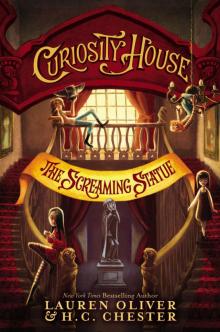 The Screaming Statue
The Screaming Statue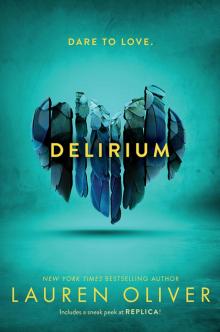 Delirium
Delirium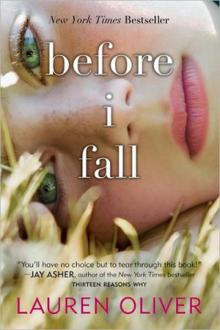 Before I Fall
Before I Fall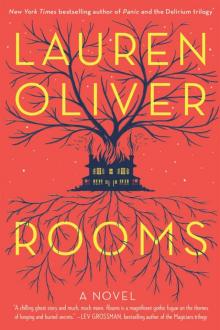 Rooms
Rooms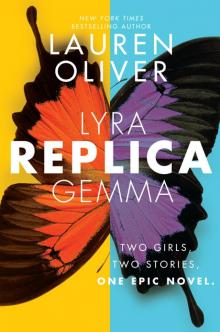 Replica
Replica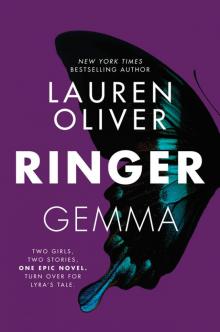 Ringer
Ringer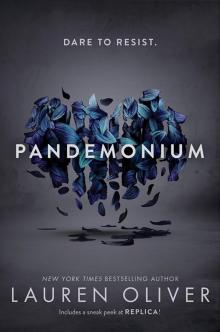 Pandemonium
Pandemonium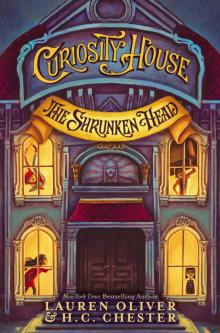 The Shrunken Head
The Shrunken Head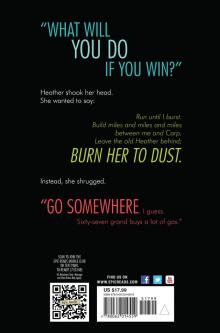 Panic
Panic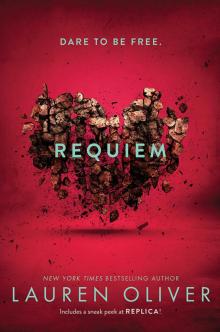 Requiem
Requiem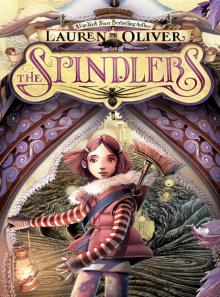 The Spindlers
The Spindlers Annabel
Annabel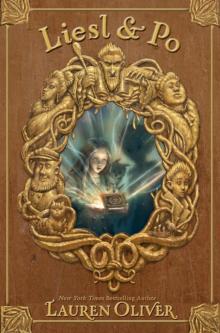 Liesl & Po
Liesl & Po Raven
Raven Alex
Alex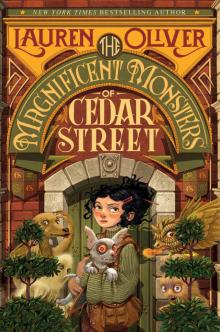 The Magnificent Monsters of Cedar Street
The Magnificent Monsters of Cedar Street Vanishing Girls
Vanishing Girls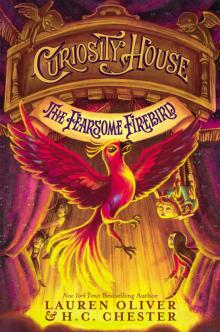 The Fearsome Firebird
The Fearsome Firebird Raven: A Delirium Short Story
Raven: A Delirium Short Story Annabel: A Delirium Short Story
Annabel: A Delirium Short Story Hana: A Delirium Short Story
Hana: A Delirium Short Story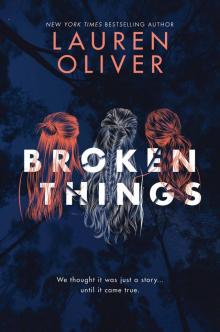 Broken Things
Broken Things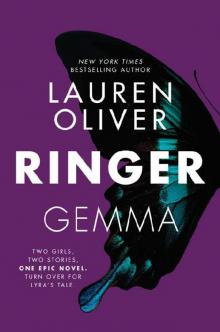 Ringer (Replica)
Ringer (Replica) Alex (delirium)
Alex (delirium)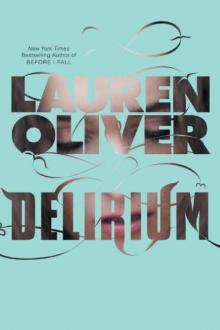 Delirium dt-1
Delirium dt-1